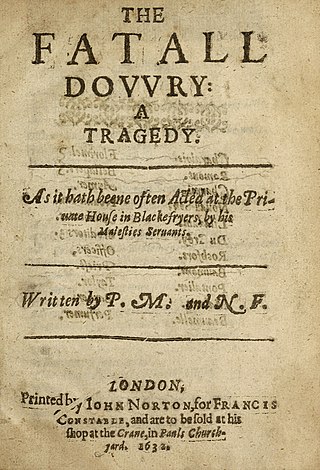Related Research Articles

Philip Massinger was an English dramatist. His finely plotted plays, including A New Way to Pay Old Debts, The City Madam, and The Roman Actor, are noted for their satire and realism, and their political and social themes.
This article contains information about the literary events and publications of 1622.
William Rowley was an English Jacobean dramatist, best known for works written in collaboration with more successful writers. His date of birth is estimated to have been c. 1585; he was buried on 11 February 1626 in the graveyard of St James's, Clerkenwell in north London.

A New Way to Pay Old Debts is an English Renaissance drama, the most popular play by Philip Massinger. Its central character, Sir Giles Over-reach, became one of the more popular villains on English and American stages through the 19th century.
Egeus is a character in A Midsummer Night's Dream, the comedy by William Shakespeare. He is an Athenian who tries to keep his daughter, Hermia, from marrying Lysander. In original performances, the actor for his role probably played the part of Philostrate as well. Egeus wants Hermia to marry Demetrius.

Ubasute is a mythical practice of senicide in Japan, whereby an infirm or elderly relative was carried to a mountain, or some other remote, desolate place, and left there to die. Kunio Yanagita concluded that the ubasute folklore comes from India's Buddhist mythology. According to the Kodansha Illustrated Encyclopedia of Japan, ubasute "is the subject of legend, but…does not seem ever to have been a common custom."
Like most playwrights of his period, William Shakespeare did not always write alone. A number of his surviving plays are collaborative, or were revised by others after their original composition, although the exact number is open to debate. Some of the following attributions, such as The Two Noble Kinsmen, have well-attested contemporary documentation; others, such as Titus Andronicus, are dependent on linguistic analysis by modern scholars; recent work on computer analysis of textual style has given reason to believe that parts of some of the plays ascribed to Shakespeare are actually by other writers.

The Roman Actor is a Caroline era stage play, a tragedy written by Philip Massinger. It was first performed in 1626, and first published in 1629. A number of critics have agreed with its author, and judged it one of Massinger's best plays.
The Duke of Milan is a Jacobean era stage play, a tragedy written by Philip Massinger. First published in 1623, the play is generally considered among the author's finest achievements in drama.
The Night Walker, or The Little Thief is an early seventeenth-century stage play, a comedy written by John Fletcher and later revised by his younger contemporary James Shirley. It was first published in 1640.
Wit at Several Weapons is a seventeenth-century comedy of uncertain date and authorship.
Hengist, King of Kent, or The Mayor of Quinborough is a Jacobean stage play by Thomas Middleton of the 1610s, but first published in 1661. It is his only overtly historical play. It was read by Pepys.

A Fair Quarrel is a Jacobean tragicomedy, a collaboration between Thomas Middleton and William Rowley that was first published in 1617.
The Custom of the Country is a Jacobean stage play, a tragicomedy written by John Fletcher and Philip Massinger, originally published in 1647 in the first Beaumont and Fletcher folio.
The Beaumont and Fletcher folios are two large folio collections of the stage plays of John Fletcher and his collaborators. The first was issued in 1647, and the second in 1679. The two collections were important in preserving many works of English Renaissance drama.

The Fatal Dowry is a late Jacobean era stage play, a tragedy written by Philip Massinger and Nathan Field, and first published in 1632. It represents a significant aspect of Field's very limited dramatic output.

Boomsday, a 2007 novel by Christopher Buckley, is a political satire about the rivalry between squandering Baby Boomers and younger generations of Americans who do not want to pay high taxes for their elders' retirement.

The Maid in the Mill is a late Jacobean era stage play, a comedy written by John Fletcher and William Rowley. It was initially published in the first Beaumont and Fletcher folio of 1647.
Love's Cure, or The Martial Maid is an early seventeenth-century stage play, a comedy in the canon of John Fletcher and his collaborators. First published in the Beaumont and Fletcher folio of 1647, it is the subject of broad dispute and uncertainty among scholars. In the words of Gerald Eades Bentley, "nearly everything about the play is in a state of confusion...."

Augustine Matthews was a printer in London in the Jacobean and Caroline eras. Among a wide variety of other work, Matthews printed notable texts in English Renaissance drama.
References
- ↑ Walford, Edward; Apperson, George Latimer (1885). The Antiquary. E. Stock. p. 173.
- ↑ David J. Lake, The Canon of Thomas Middleton's Plays, Cambridge, Cambridge University Press, 1975; p. 206.
- ↑ Lake, pp. 206–11.
- ↑ George R. Price, "The Authorship and the Manuscript of The Old Law," Huntingdon Library Quarterly Vol. 16 (1953), pp. 117–39.
- ↑ Terence P. Logan and Denzell S. Smith, eds., The Popular School: A Survey and Bibliography of Recent Studies in English Renaissance Drama, Lincoln, NE, University of Nebraska Press, 1975; pp. 70, 265.
- ↑ William Gifford,The Plays of Philip Massinger, single-volume edition, New York, H. B. Mahn, 1857; p. 496.
- ↑ R. H. Super: "Editor's Preface," Anthony Trollope: The Fixed Period, ed. R. H. Super (University of Michigan Press: Ann Arbor, 1990) v–xv.